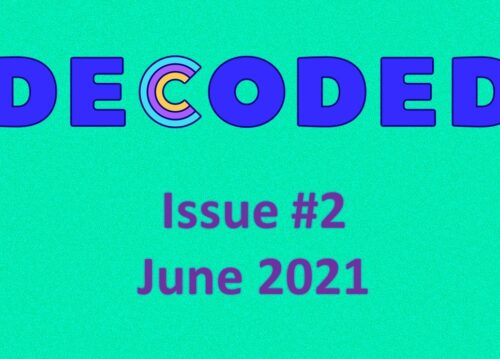As we’re gearing up to bring you Issue #2 of Decoded Pride, we wanted to sit down with the editors of this issue to find out what they love to read, why speculative fiction matters to them, and what their wildest dreams are for the future of Decoded Pride!
In this edition, we’re talking to Monika Estrella Negra, writer, filmmaker, journalist, editor, critic, and curator of all things radical in media. Monika talks to us about her love of vengeance arcs, liberation, and a film deal we can only hope will come to pass.
And, don’t forget you can pre-order your subscription to Issue #2 now or get your full-color PDF version of Decoded Pride Issue #1 (and eBook reader copies as well!) at the Queer Spec Store!
What are your favorite kinds of stories to read?
I love a story that transports me to where it is occurring. Stories that feel familiar to me. That could be a memoir, a biography, a non-fictional political book – something that brings the human spirit to life. I find that the more I relate to a character or person, the more I become engrossed. I love horror stories that have a glimmer of hope, a dash of tragedy, and a sweet vengeance arc. I’ll take it all if it helps me envision another world outside of this one.
Why do you like speculative fiction in particular?
There are far more opportunities to blur the lines of reality and fantasy. Life would be more interesting if magic stuff happened, that’s a fact. But I also love the possibility of telling allegories in the most fantastic and at times horrific scenarios in order to get the reader to understand what you are trying to tell them. It’s a wild ride and I like that type of spice to my literary choices.
What’s the connection between speculative fiction and queerness in your mind? Why is speculative fiction so important to queer stories?
Queerness has the capacity to shift public opinion on what is ‘normal’. The binary hive minds that silence the possibilities of what the universe is capable of. With speculative fiction we are able to think of another possible world, one where we can imagine ourselves as liberators of the things that oppress us or sadden us. While liberation will happen for us one day, I like to think of speculative fiction as being a form of therapy for those who see no hope to come in the future. It allows us to expand on our own futures and understanding of what we can conceive if we keep pushing.
What was the first queer speculative story you read that blew you away? Why did it move you so?
Violet and Claire by Franchesca Lia Block. Actually, every Francesca Lia Block book. I was obsessed with her when I was a teen. Violet and Claire are two girls growing up in LA. Violet is an aspiring filmmaker and Claire was a ‘fairy’. The book is surrealist and magic, and it explores the love between the girls beautifully. Violet actually inspired me to become a filmmaker.
What’s your favorite part of working on Decoded Pride?
Reading all of the stories! The first edition was such a blast to read and it inspired me to grab my own pen and jot down my ideas for the world to come. Also, working with two highly intelligent and talented writers/editors/creators/superheroes has helped me hone my own set of skills. I think it is super important for sensitivity editing to be apart of every literary or creative project in this day and age. There are no more excuses – we can all contribute to a world where everyone can feel safe about the art they consume.
What are your wildest dreams for the future of Decoded Pride?
A multi-million dollar contract and a film adaptation of the stories we curate, that we direct ourselves! Can you imagine?



